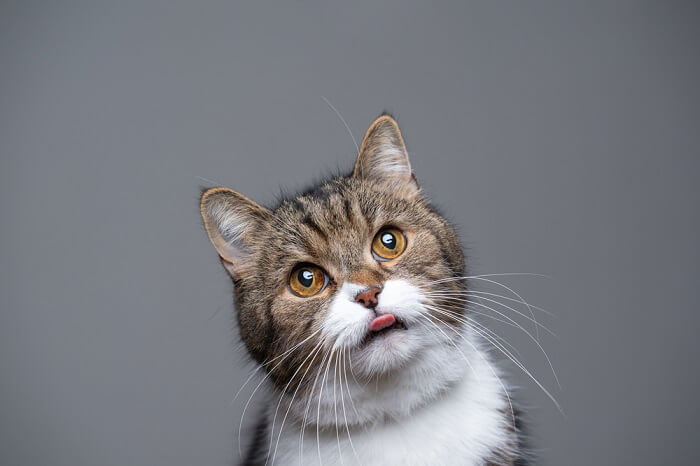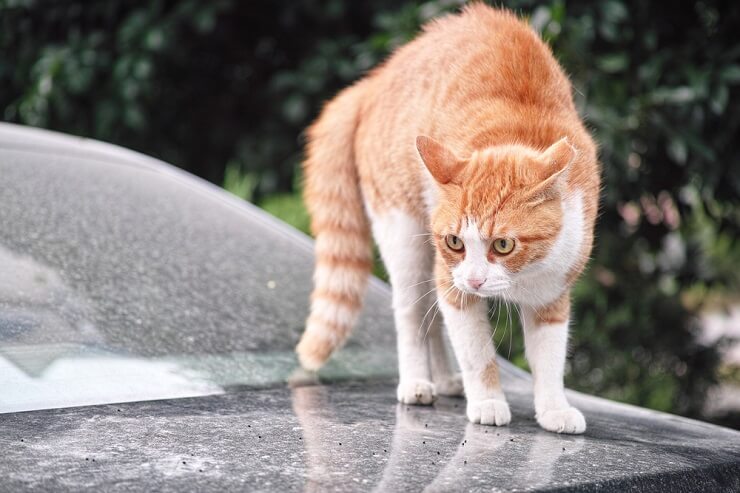Why Do Cats Stick Their Tongues Out?
This page contains affiliate links. We may earn money or products from the companies mentioned in this post through our independently chosen links, which earn us a commission.
Social media is full of #Toungeouttuesday photos of wonderful dogs sticking their tongue out, but have you ever wondered what’s that unusual but adorable behaviour your kitty displays while their tongue partially sticks out for a brief time?
Cats similarly to dogs protrude their tongue out now and again, in most circumstances this is an innate behaviour with nothing to worry about, however did you know that excessive tongue movements, exaggerated lip licking and/or extreme swallowing can signal an underlying health issue?
In this article we’ll discuss the unique features of a cat’s taste organ and consider whether you should be concerned about your feline’s protruding tongue.
Interesting Cat Tongue Facts
A cat’s tongue is an incredible organ covered in countless tiny, backwards facing spikes called papillae which are made of keratin.
Recent research revealed that the feline tongue’s microstructures are not only brilliant at helping cats pick up food bits, but also combing through the fur plus eliminating any dust, dirt or parasites with the accumulated hair effortlessly passes through the throat to form a hairball within the tummy instead of stick to the tongue. Moreover, the tough barbs also help a feline remove feathers from a prey animal they’re about to ingest and after this, allows a cat to get rid of traces of prey organisms that have gotten on their bodies while consuming the prey.
Lastly, the tongue is the primary taste organ containing about 470 taste buds as compared to humans who have around 9,000. Conversely, cats have twice as much olfactory receptors in their nasal passage than humans which contribute to a cat’s sense of taste and may explain a feline’s inclinations for foods with strong odours.
Why Do Cats Stick Their Tongues Out?
There are several explanations behind this cute yet peculiar looking behaviour, let’s examine a number of them closely.
Environmental Discovery and Detection of Chemical Messages
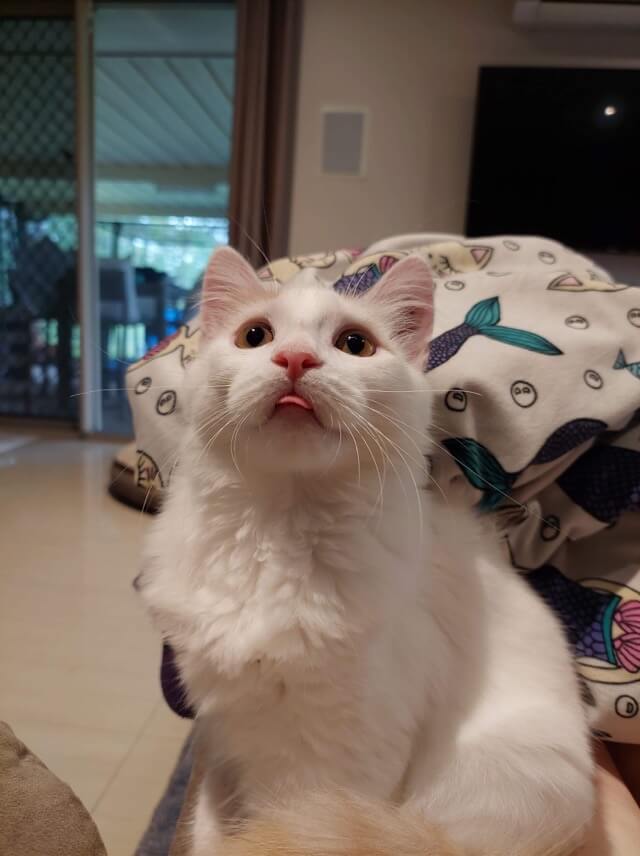
Most common reason that a cat sticks his tongue out is to detect and gather information about their surroundings also called the flehmen response. Flehming is a behaviour during which many mammals including the Felidae family holds their mouth open, with the lips somewhat divided; the upper lip is often raised up, and it looks as if the feline is ‘gaping’ (gathering pheromones into the passageways).
The Flehmen behaviour allows detection of chemical messages of urine, faeces or excretions from another cat’s body parts. Since pheromones are transferred in urine equally are airborne, moggies will be seen to lick the source of the odour and use their tongue to transmit the pheromones to the Vomeronasal organ (VNO) or Jacobson’s organ.
In order to do so, cats flick their tongue in and out while moving their tongue behind the teeth over the openings to the VNO which helps them obtain information regarding sexual receptivity, familiarity and territoriality of another pussycat within the area.
Watch the following video to see a cat performing the Flehmen response.
Your Cat is Relaxed or Napping
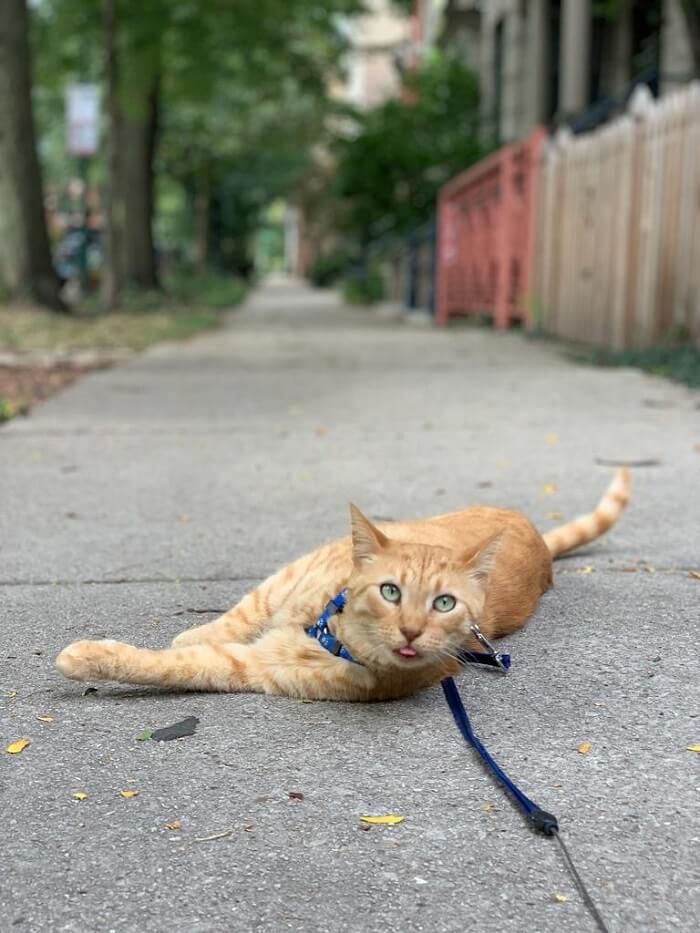
Occasionally when your cat is relaxed or napping, their tongue may stick out a little, probably because their jaw is loose, there is no muscular or nervous tension enabling their tongue to protrude slightly with no reason to worry.
Your Cat Is Distracted During Grooming
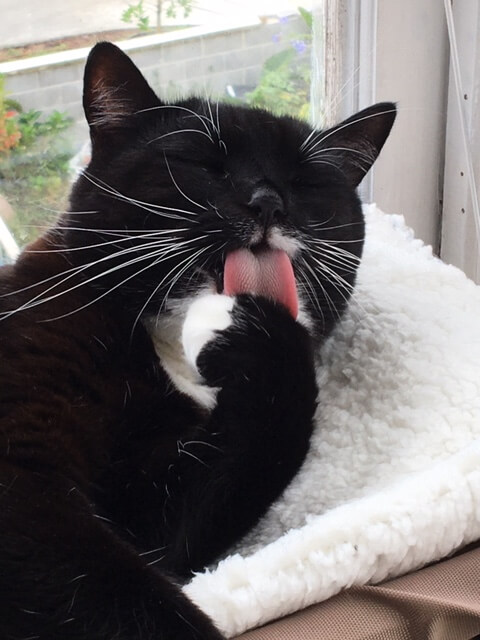
Felines engage in self-grooming including in physical communication with members of their social group using their tongue, this is referred to as Allo-grooming and is seen when one cat licks the fur of another, typically around their face, head and neck. If your cat gets distracted during a grooming session, they may forget to insert their tongue into place for a passing moment with nothing to be concerned about.
To Gain Sensory And Tactile Information About An Object
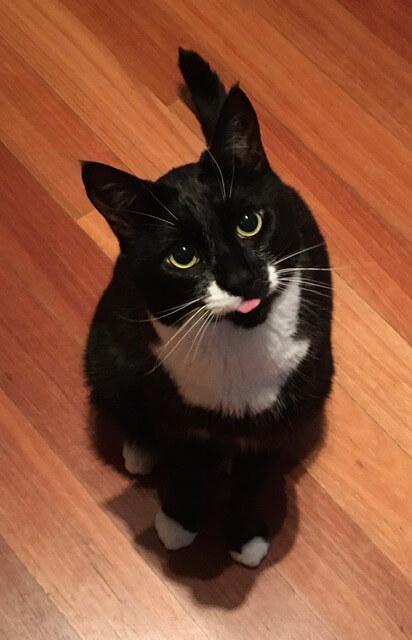
A cat will often jut their tongue when object licking to gain sensory and tactile information about an item. if your cat licks or bites into something they don’t like, they might protrude the tongue for a brief moment to ensure it’s safe to be ingested.
Display Of Positive Response To Silver-vine, Valerian And Honeysuckle
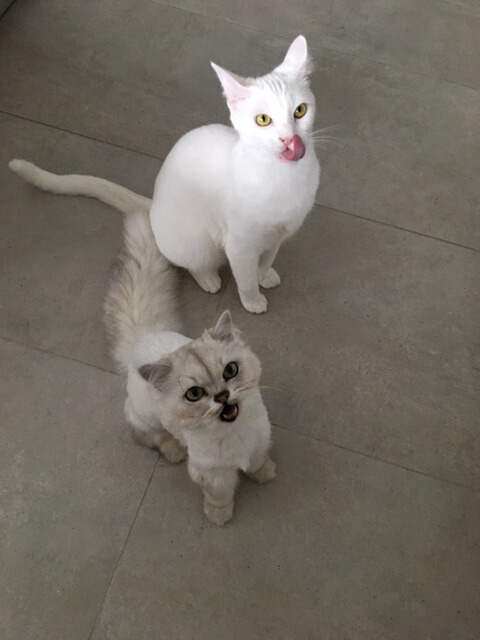
In a recent experiment, cats who been exposed to plants species like silvervine, valerian and honeysuckle exhibited behaviours such as sniffing, shaking, rolling, rubbing, drooling and licking by which the cat’s tongue popped from its mouth and stroked the plant material for a short period, all proved to have a positive effect on cats.
When Should You Be Concerned About Your Cat Sticking Their Tongue Out?
In most cases the behaviour is normal, however there’ll be times when a sticking tongue may be an indication your cat is unwell, let’s review few common health and welfare concerns.
Your Cat Is Unwell Or Nauseated
A cat that’s feeling unwell or nauseated may display signs of drooling or salivation, lick their lips, exhibit excessive swallowing with reduced appetite together with restlessness whilst others may remain in a very hunched-up posture in one spot. If your cat is nauseated and vomiting, take them to the veterinarian as soon as you can, particularly if they’re unable to keep food or water down, a kitten or an elderly feline.
Dental Disease
Many dental diseases can cause discomfort plus pain in both humans and cats. Periodontal disease, Gingivostomatitis, resorptive lesions, inflammatory conditions of the mouth and gum disease are extremely common in felines. Frequent presentations of oral pain are drooling, bad breath, dropping food from the mouth, head shaking, repetitive jaw motions while eating and excessive tongue movements have also been observed. If you’re worried your cat may have dental problems, organise a vet visit to complete a thorough mouth assessment.
Feline Orofacial Pain Syndrome (FOPS)
FOPS is an illness categorized by face and tongue disfigurement including other behavioural signs like exaggerated licking, chewing movements and pawing at the mouth. In serious cases, cats may mutilate their tongue and lips, even requiring surgery to repair the tongue. Fops is prevalent in Burmese cats, although been seen in Tokenise, Burmilla, Siamese and in the domestic shorthair.
Watch the following Video of a Burmilla cat with FOPS demonstrating tongue discomfort and pawing at the mouth.
Signs of Poisoning
Intoxication isn’t that uncommon in cats thanks to their inquisitive nature, they groom any material off their coat combined with a deficiency in certain liver enzymes, incapable to disperse certain chemicals.
Signs of poisoning will depend on the actual toxin ingested or exposed to, most typical signs include salivation, drooling, foaming at the mouth, tongue protrusion, vomiting and seizures all warranting an immediate contact with your vet since it may be life threatening. If you believe your cat has been poisoned and know the source of the poison, please take the container, plant or material with you to the vet.
Heat Stroke
You may be surprised to find out that despite its origin as a desert dweller, cats don’t tolerate heat better than humans and if you reside in a hot climate like we do, you know cats are vulnerable to Hyperthermia and must be kept from spending an excessive amount of time in the sun. Signs of heat stroke can manifest as lethargy with heavy panting, drooling, confusion, protuberance of a cat’s tongue and even collapse, all requiring emergency veterinary care.
Your Cat May Be Anxious Or Stressed
When a cat is unable to avoid a situation or a person and withdrawal isn’t possible, for instance when a cat is restrained for medication administration, it’s behavioural indication of anxiety-fear may change from retreat to defence which can include salivation, tongue licking nose and/or exaggerated swallowing, hissing plus fast breathing which can advance to open-mouthed panting with the tongue exposed in extreme cases (Sparkes, 2016). The most effective way to prevent or reduce stress is to enhance a cat’s environment which gives a cat a profound sense of control.
Signs Of Frustration
Similar to humans, moggies will feel frustrated when they don’t get what they want or when they can’t obtain certain things like food, play or outdoor time. A frustrated cat may exhibit destructive behaviour, bite, scratch, tongue touch over the nose, raise its upper lip, stretch its mouth and may redirect his/her frustration at the caregiver or a nearby pet.
Conclusion
There are many reasons why cats stick their tongues out, from self-grooming to chemical detection, pure relaxion and even because of ailment, knowing what’s typical behaviour for your individual kitty will help you identify when this behaviour is normal or when you should be concerned.
If you notice your feline is protruding their tongue out excessively followed by the symptoms listed above, take your cat to the vet for a comprehensive examination.
Bibliography
Care, I. C. (2020, September 01). Module 2 Senses and communication. UK. Retrieved March 05, 2022
Clare Rusbridge, S. H.-M. (2010). Feline orofacial pain syndrome (FOPS): a retrospective study of 113 cases. Journal of Feline Medicine and Surgery, 12, 498e508. Retrieved March 01, 2022, from doi:10.1016/j.jfms.2010.03.005
Dynamics, A. P. (2016, November 17). Cat Tongues Are Even ‘Handier’ Than You Imagined. USA. Retrieved March 12, 2022, from https://www.newswise.com/articles/cat-tongues-are-even-handier-than-you-imagined
Hays, B. (2016, November 21). Study reveals the unique surface structures on a cat’s tongue. Retrieved March 07, 2022, from https://www.upi.com/Science_News/2016/11/21/Study-reveals-the-unique-surface-structures-on-a-cats-tongue/8771479759136/
Heath, I. R. (2016). Feline Behavioral Health and Welfare. St Louis, MO: Elsevier. Retrieved March 06, 2022
Hu, A. C. (2018, November 19). Cats use hollow papillae to wick saliva into fur. (PNAS, Compiler) Retrieved March 05, 2022, from https://www.pnas.org/doi/10.1073/pnas.1809544115
Lincoln, i. a. (2018). Cat Behaviour Described. (I. C. Lincoln, Compiler) UK. Retrieved March 08, 2022
Research, B. V. (2017, March 16). Responsiveness of cats (Felidae) to silver vine (Actinidia polygama), Tatarian honeysuckle (Lonicera tatarica), valerian (Valeriana officinalis) and catnip (Nepeta cataria). (BMC, Compiler) Retrieved March 11, 2022, from https://bmcvetres.biomedcentral.com/articles/10.1186/s12917-017-0987-6
Sparkes, D. S. (2016). ISFM Guide to Feline Stress and Health; Emotions underlying distress. Tisbury, Wiltshire, UK: International Cat Care. Retrieved March 09, 2022
Frequently Asked Questions
Why do cats stick their tongues out when they are relaxed
Instinctively when a cat is relaxed, their jaw and muscles may loosen while their tongue may bulge out for a fleeting period.
Certain brachycephalic cat breeds like Persians may jut their tongue for extended periods due the shape of their skull and jawbone, moreover senior short-faced breeds may lose a bit of muscle tone within the mouth and their tongue may slump forward with the tip of the tongue bulging slightly.
Why do cats stick out their tongues if you scratch a certain spot on their back
When you scratch certain cats in a sensitive spot on their back, it releases happy hormones which may trigger poking of their tongue even a grooming of your hand in response.
Why do cats stick their tongues out when they are sleeping
Cat blepping during a snooze is normal behaviour which is fairly common to flat-faced breeds during deep relaxation. Cats need lots of sleep so avoid disturbing their naptime.

